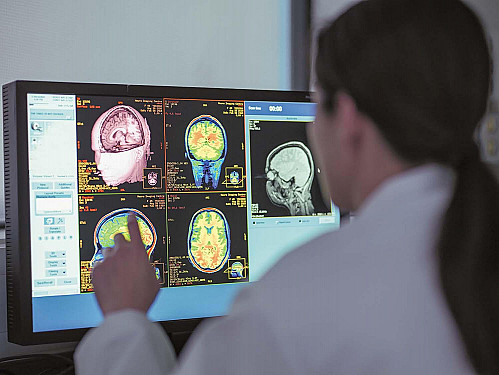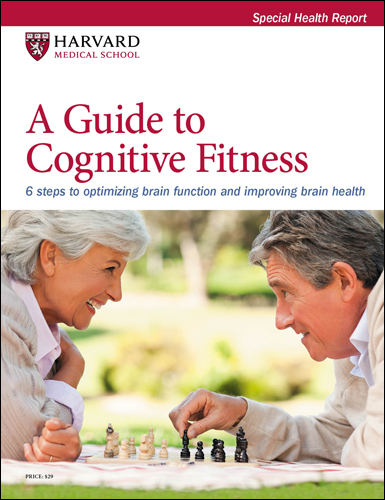Menopause and brain fog: What's the link?
Research ties severity of certain menopause symptoms to cognitive performance.
- Reviewed by Toni Golen, MD, Editor in Chief, Harvard Women's Health Watch; Editorial Advisory Board Member, Harvard Health Publishing; Contributor

Reaching for the right word. Wondering why you walked into a room. Forgetting appointments. These signs of "brain fog" might be common at midlife, but our accumulation of birthdays doesn't necessarily tell the whole story.
With midlife comes menopause, and new research suggests cognitive blips may be linked to how severely we experience menopause symptoms — especially depression and sexual problems such as painful sex, low desire, or trouble with arousal.
"Brain fog is one of the lesser-known symptoms of menopause, but it's so common," says Dr. Heather Hirsch, head of the Menopause and Midlife Clinic at Harvard-affiliated Brigham and Women's Hospital. "We're talking about it more now, but the majority of women don't associate brain fog with menopause the way they do hot flashes."
Stages and symptoms
Indeed, the new study drives home that hot flashes — while considered a menopause hallmark — are far from the only menopause symptom that can dramatically influence daily life, says Dr. Hadine Joffe, executive director of the Connors Center for Women's Health and Gender Biology at Brigham and Women's Hospital and a professor of psychiatry at Harvard Medical School. "People think of brain fog more as a result of chronological aging than of hormone-related aging," she says. "Either way, it can have a comprehensive effect on well-being."
Published online Jan. 12, 2022, by the journal Menopause, the research focused on 404 women in India ages 40 to 65 who weren't using hormone therapy. The researchers divided the women into groups based on their stage of menopause to compare how often and how severely they experienced various symptoms. The researchers also examined how the severity of menopause symptoms related to cognitive performance in areas such as memory, attention, and language skills.
Late-postmenopausal participants, whose periods had ceased more than five years before, scored highest for depression and sexual dysfunction, while anxiety and hot flashes were most often reported among those who entered menopause fewer than five years earlier.
Estrogen drop to blame?
After adjusting the results for factors such as age, marital status, and education level, researchers learned that severe depression and greater sexual dysfunction stood out as the only symptoms significantly linked with cognitive performance. No link was found between hot flashes and brain performance, though earlier research has shown inconsistent results.
The study had several limitations. While it shows an association between severity of menopause symptoms and cognitive problems, it can't prove a cause-and-effect relationship. We also don't know which came first — depression and sexual problems, or brain fog. "We just see they happened around the same time," Dr. Hirsch says.
Why might this occur? With estrogen receptors in virtually every organ, our bodies are highly sensitive to hormone fluctuations, Dr. Hirsch explains. This means estrogen loss can announce itself in how our brain works. Ultimately, however, "we don't know why this happens," says Dr. Joffe, "because many things are happening across the menopause transition along with the drop in estrogen."
But this brain fog probably won't last. The long-term SWAN (Study of Women's Health Across the Nation) trial, to which Dr. Joffe and other Harvard researchers contribute, suggests perimenopausal women temporarily have trouble learning new information. "It does get better with time as women get past menopause," Dr. Joffe says.
Tackling brain fog
Dr. Joffe and Dr. Hirsch offer these strategies to compensate for brain fog.
Stay calm. Panicking about thinking and memory issues can actually make them worse. "Awareness is valuable, but go easy on yourself," Dr. Joffe says. "Menopause is an intense time of life, and midlife changes on the brain and body come and go."
Challenge yourself. Take a different route to familiar destinations like the grocery store and walk down aisles in a different pattern when you get there. "You want to create new memories and new processes rather than always going by habit and routine," Dr. Joffe says.
Get moving. Regular exercise benefits your brain along with the rest of your body, with research indicating it improves cognition.
Focus. "How many of us go into a room and say, 'Why am I in here?' It's because we thought of three other things along the way," Dr. Joffe says. "Slow down, and prioritize the one thing at hand."
Write it down. Sticky notes, lists, and other reminders pay huge dividends when you're feeling frazzled.
Sleep more. This can be a tall order during menopause, since the fall in estrogen levels has also been linked to insomnia. Cut back on caffeine, and skip caffeinated drinks after lunch.
Treat underlying conditions. Tackle depression or mood issues with cognitive behavioral therapy, medication, or a combination.
Image: © Juanmonino/Getty Images
About the Author

Maureen Salamon, Executive Editor, Harvard Women's Health Watch
About the Reviewer

Toni Golen, MD, Editor in Chief, Harvard Women's Health Watch; Editorial Advisory Board Member, Harvard Health Publishing; Contributor
Disclaimer:
As a service to our readers, Harvard Health Publishing provides access to our library of archived content. Please note the date of last review or update on all articles.
No content on this site, regardless of date, should ever be used as a substitute for direct medical advice from your doctor or other qualified clinician.
















